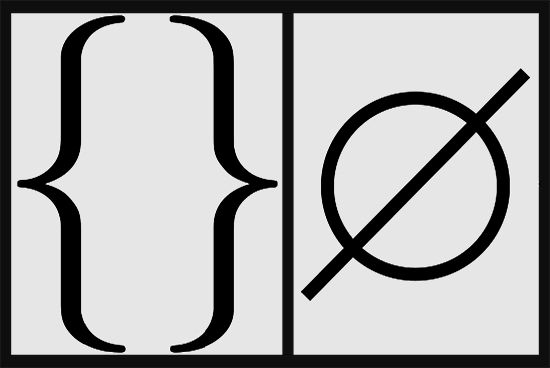Exploration & Derivation of Nothing
"Nothing": From the Void to Vernacular - An Exploration of its Etymology, Evolution, and Existential Significance
"Nothing" is such a prevalent term in the English language that we seldom pause to consider its depth and versatility. As a word, it represents the concept of "absence," and its usage can range from the mathematical to the philosophical, from the trivial to the significant. A word often taken for granted, "Nothing" has a rich history and continues to be a significant linguistic and cultural tool.

Etymology and Derivation
The English word "nothing" finds its roots in the Old English "nān þing," which translates directly to "not a thing." This is a combination of "nān" meaning "not one" and "þing" meaning "thing." Over time, these two words merged into the Middle English "no-thing," and eventually, the modern English "nothing."
Cultural Significance
"Nothing" as a concept is deeply woven into the fabric of human thought. It is a vital tool for defining the world around us by asserting what is not present or what is absent. It has been used to denote the absence of material objects, the absence of action, the absence of thought, the absence of feeling and even the absence of existence itself.
FEEL NOTHING
Song by The Plot in You

Lyrics
Before I say another word
Just know that my intentions were pure
But you can't stand to be in silence
All you can hear is your own voice
Fueling delusion in you, and I'm just
So sick of backing down that I might just spill it all
And if I do you won't be coming back without a deep scar in your soul
Are you not sick of playing games? Sick of giving blame?
Sick of fucking living like the world has never given you a life-defining day?
And I can't relate
And I feel nothing for you
I feel nothing for you
And I feel
It's too late, too late
I've buried this and it's evident
You won't change, won't change
(I feel nothing)
My mind is torn
I hate it but I long to feel what I felt before
But you just keep moving towards me
What do I do? What do I say?
Can you kindly just refrain
What's here for me, why hide the truth?
That I feel nothing for you
I feel nothing for you
And I feel
It's too late, too late
I've buried this and it's evident
You won't change, won't change
(I feel nothing for you)
Broke away but you're starving for closure
Seam together but you know that I know ya
Know this is real, this is real
It's too late, too late
I've buried this and it's evident
You won't change, won't change
I feel
It's too late, too late
I've buried this and it's evident
You won't change, won't change
That I feel nothing for you
I feel nothing for you
And I feel
In the realm of philosophy, the concept of "nothing" is crucial. It challenges the human mind to grapple with the enigma of non-existence. The concept of "nothing" poses questions about the nature of existence, reality, and the universe, with philosophers such as Socrates, Nietzsche, and Heidegger all exploring the concept in their works.
In mathematics, "nothing" is symbolized by zero or the empty set, fundamental concepts that allow for the construction of complex mathematical systems. Zero plays a critical role in arithmetic, algebra, calculus, and virtually every branch of mathematics. The empty set, a set containing no elements, forms the basis of set theory, a fundamental aspect of modern mathematics.

NUL SET | EMPTY SET
Read more about the EMPTY SET in Wikipedia. (https://en.wikipedia.org/wiki/Empty_set)While the empty set is a standard and widely accepted mathematical concept, it remains an ontological curiosity, whose meaning and usefulness are debated by philosophers and logicians.
The empty set is not the same thing as nothing; rather, it is a set with nothing inside it and a set is always something. This issue can be overcome by viewing a set as a bag—an empty bag undoubtedly still exists.

Read this article Can you make something out of nothing? where the author explores the concept of emptiness in set theory, and explain how zero went from “nothing” to “something”
And in another article from a 2010 post called: Theory of everything - There is absolutely nothing discusses a simple mathematical equation: to represent everything including nothing is zero = infinity. The application of this simple fact will solve all other complex equations. Really? Read the article to see his proof.
In literature and media, "nothing" often carries significant symbolic weight. Shakespeare's "Much Ado About Nothing," for example, is a play on words where "nothing" is used to represent both insignificance and eavesdropping, pivotal themes in the play. The concept is often used metaphorically to represent emptiness, meaninglessness, or despair.
Or consider three musical movements by John Cage called 4'33" in which the musicians think about silence or perhaps nothing for 4 minutes and 33 seconds.

4'33" (In Proportional Notation by John Cage
1952/1953
For more information go to the MOMA page
While the lost original score used conventional musical notation to signify three periods of silence, this version is composed of a series of vertical lines that visually represent the duration of four minutes and thirty-three seconds of silence..
Has "Nothing" Become Meaningless?
Contrary to its literal meaning, the word "nothing" is far from meaningless. Its importance has not diminished but rather grown with time. As our understanding of the world around us has expanded, so has our understanding and application of "nothing."
The term's versatility makes it indispensable in language. We use "nothing" to denote a lack of quantity, a lack of importance, the outcome of a null action, and more. We use it to comfort ("It's nothing to worry about"), to express indifference ("I feel nothing"), or to indicate an absence ("There's nothing in the cupboard").
While the term "nothing" can be used in trivial contexts, it still holds immense philosophical weight. Our ongoing attempts to understand the universe, our existence, and consciousness continually bring us back to grappling with the concept of "nothing."
Some Final Thoughts for the moment.....
The word "nothing," despite representing the absence of anything, is, paradoxically, a term filled with significance. It is a fundamental concept, a philosophical enigma, a mathematical tool, and a linguistic necessity. Far from becoming meaningless, the term "nothing" continues to hold a mirror to the human condition, reflecting our understanding of the universe, our shared experiences, and our individual perceptions. The term's omnipresence in our language, culture, and thought is a testament to its importance. In a world filled with "something," the concept of "nothing" helps us distinguish, define, and comprehend our existence.

The future of "nothing" is likely to be as complex and significant as its past. As we delve deeper into the realms of quantum physics, we encounter fascinating concepts like vacuum fluctuations and quantum foam, where "nothing" – the vacuum of space – is not truly empty but teeming with transient particles and energy. Similarly, in philosophy and metaphysics, debates about the nature of "nothingness" and its relation to existence continue to engage thinkers.
In a societal context, the term "nothing" will continue to be wielded as a tool for expression. As our societies evolve, so too will our language, and the term "nothing" will adapt and change. However, its core concept – the absence of something – will likely remain steady, a testament to the stability of this versatile term.
It should be obvious by now that "nothing" is far from a trivial term. Its presence in our language and thought is a testament to its importance, its versatility, and its enduring significance. From mathematics to philosophy, from literature to everyday conversation, "nothing" is a term that encapsulates a concept fundamental to human understanding. It represents not just the absence of something, but also the potential for anything and everything. And that is the beauty of "nothing."